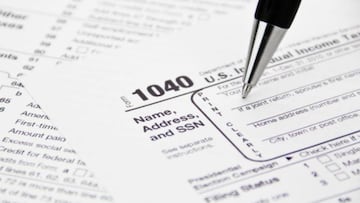Can I get a loan using my tax refund in 2023?
If you want early access to your money you can claim a tax refund loan, but the companies offering them will charge for the service.


Tax season is not yet underway, but some filers are choosing to take advantage of a financial service that can give them access to their tax refunds ahead of time.
Known as a tax refund loan, many tax preparation firms offer an advance on IRS refunds for their customers. Many of the biggest names in the industry, such as Jackson Hewitt, H&R Block and TurboTax, offer the loans with 0% interest, provided you use them to file your income tax return.
The exact terms vary between different providers but they are typically available between December and February. Sometimes known as ‘refund advances’, the service essentially lends you the value of your refund before the IRS has issued the payment, and they are then repaid once the actual refund arrives.
The upper limit for the service can be as much as $4,000 and may be dispersed within 24 hours. But bear in mind that while the loan itself is often 0% interest, these companies do charge for the tax preparation service.
Related news
Who is eligible for a tax refund loan?
The firms offering tax refund loans all require you to use their tax preparation services to claim an advanced refund. In some instances, the loans are not available to filers in certain states so check the specific requirements with your provider.
There is also a minimum tax refund amount to be eligible for the service, typically around $500.
Many lower income filers will be eligible to use the IRS Free File tool, an online service that provides tax preparation help for free. This program is designed to make the whole process easier and should ensure that you receive all the tax benefits that you are entitled to. If you use this tool you will not be able to claim a tax refund loan through any of the private tax preparation services.
While a tax refund loan may not seem like a big deal since your refund amount will ultimately pay it off, there are some serious downsides that come with this type of financial product. https://t.co/VW6aOpa6Hw pic.twitter.com/nGtybKxQjn
— Forbes (@Forbes) January 2, 2023
Your tax refund could be lower this year
Many filers will be waiting eagerly for their tax refund, but you should be aware that this year’s payment may be substantially less than recent years’. Back in November the IRS issued a press release warning: “Refunds may be smaller in 2023″.
Related stories
In recent years the federal government has implemented a series of financial relief programs designed to offer support during the pandemic. For many of these programs – like stimulus checks and the boosted Child Tax Credit payments – distribution of the support was overseen by the IRS.
This meant that many filers received thousands of dollars extra in their tax refund. However the vast majority of pandemic-era support has now elapsed and refunds will return to pre-covid levels.

